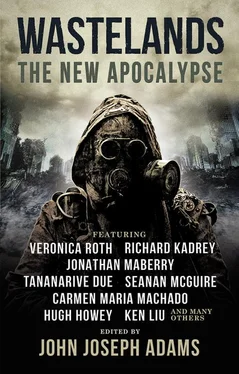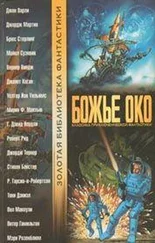Came a third cry then, still farther away.
“Jesus,” Lanyan said.
“They’re surrounding us,” Natalie said.
“They’re?” Kerans said. “They’re? Who the hell do you think could be out there in that?”
Natalie turned and met his gaze. “I don’t know,” she said.
* * *
They checked the house, throwing deadbolts, locking interior doors and windows. Kerans didn’t get the windows. You wanted to get inside bad enough, you just broke the glass. Yet there was something comforting in sliding the little tongue into its groove all the same. Symbolic barriers. Like cavemen, drawing circles of fire against the night.
As for sleep, forget it.
He leaned against the sofa, draped in his sleeping bag, envying Felicia the oblivion of the oxycodone. Her skin was hot to the touch, greasy with perspiration. He could smell, or imagined he could smell, the putrescent wound, the inadequate dressing soaked with gore.
Across the room sat Lanyan, the Benelli flat across his legs. At the window, her back propped against the wall, Natalie, cradling the pistol in her lap. Kerans felt naked with just the hunting knife at his belt.
The snow kept coming, slanting down past the streetlamp, painting the room with that strange, swimming light. Lanyan’s face looked blue and cold, like the face of a dead man. Natalie’s, too. And he didn’t even want to think about Felicia, burning up under the covers, sweating out the fever of the infection.
“We should look at her leg,” he said.
“And do what?” Natalie responded, and what could he say to that because there was nothing to do, Kerans knew that as well as anyone, yet he felt compelled in his impotence to do something, anything, even if it was just stripping back the sleeping bag and staring at the wound, stinking and inflamed, imperfectly splinted, oozing blood and yellow pus.
“Just keep doling out those drugs,” Lanyan said, and Kerans knew he meant the oxycodone, not the amoxicillin, which couldn’t touch an infection of this magnitude, however much he prayed—and he was not a praying man. He couldn’t help recalling his mother, dying in agony from bone cancer: the narrow hospital room, stinking of antiseptic, with its single forlorn window; the doctor, a hulking Greek, quick to anger, who spoke in heavily accented English. We’re into pain management now , he’d said.
“How much is left?” Natalie said, and Kerans realized that he’d been turning the prescription bottle in his hands.
“Ten, maybe fifteen pills.”
“Not enough,” she said. “I don’t think it’s enough,” and a bright fuse of hatred for her burned through him for giving voice to thoughts he could barely acknowledge as his own.
After that, silence.
Kerans’s eyes were grainy with exhaustion, yet he could not sleep.
None of them could sleep.
Unspeaking, they listened for voices in the storm.
* * *
At two, they came: one, two, three metallic screeches in the wind.
Lanyan took one window, Natalie the other, lifting her pistol.
Kerans stayed with Felicia. She was stirring now, coming out of her oxycodone haze. “What is it?” she said.
“Nothing. It’s nothing.”
But it was something.
“There,” Natalie said, but she needn’t have said it at all.
Even from his place by the sofa, Kerans saw it: a blue shadow darting past the window, little more than a blur, seven feet long or longer, horizontal to the earth, tail lashing, faster than anything that size had any right to be, faster than anything human. There and gone again, obscured by a veil of blowing snow.
Kerans’s own words mocked him. Imagination. Shapes in the snow.
He thought of that icy snow tapping like fingernails at the window.
Let me in.
Felicia said, “Dave? What is it, Dave?”
“It’s nothing,” he said.
Silence prevailed. Shifting veils of snow.
“What the hell was that thing?” Lanyan said.
And Natalie from her window. “Let’s play a game.”
Nobody said a word.
“The game is called ‘What if?’” she said.
“What are you talking about?” Kerans said.
“What if you were an alien species?”
“Oh, come on,” Kerans said, but Lanyan was grim and silent.
“Way ahead of us technologically, capable of travel between stars.”
“This is crazy, Dave,” Felicia said. “What is she talking about?”
“Nothing. It’s nothing.”
“And what if you wanted to clear a planet for colonization?”
“You read too much science fiction.”
“Shut the hell up, Dave,” Lanyan said.
“We’re intelligent. They would try to—”
“We’re vermin,” Natalie said. “And what I would do, I would engineer some kind of virus and wipe out ninety-nine percent of the vermin. Like fumigating a fucking house.”
“And then?” Lanyan said.
“Then I’d send in the ground troops to mop up.”
Kerans snorted.
“Dave—”
“It’s craziness, that’s all,” he said. He said, “Here, these’ll help you sleep.”
Nothing then. Nothing but wind and snow and the sound of silence in the room.
After a time, they resumed their posts on the floor.
Felicia, weeping, lapsed back into drugged sleep.
“We’re going to have to get to the Yukon,” Natalie said.
“We can’t see a fucking thing out there,” Kerans said.
“At first light. Maybe the snow will stop by then.”
“And if it doesn’t?” Lanyan said.
“We make a run for it.”
“What about Felicia?” Kerans said.
“What about her?”
Kerans looked at his watch. It was almost three o’clock.
* * *
He must have dozed, for he came awake abruptly, jarred from sleep by a distant thud. A dream, he thought, his pulse hammering. It must have been a dream—a nightmare inside this nightmare of dark and endless snow, of a plague-ravished world and Felicia dying in agony. But it was no dream. Lanyan and Natalie had heard it, too. They were already up, their weapons raised, and even as he stumbled to his feet, shedding like water the sleeping bag across his shoulders, it came again: a thump against the back of the house, muffled by snow and the intervening rooms.
“What is it?” Felicia said, her voice drowsy with oxycodone.
“Nothing,” he said. “It was nothing. A branch must have fallen.”
“That was no branch,” Natalie said. “Not unless it fell twice.”
And twice more after that, two quick blows, and a third, and then silence, a submarine hush so deep and pervasive that Kerans could hear the boom of his heart.
“Maybe a tree came down.”
“You know better,” Lanyan said.
“Dave, I’m scared,” Felicia whispered.
“We’re all scared,” Natalie said.
Felicia began softly to weep.
“Shut her the fuck up,” Natalie said.
“Natalie—”
“I said shut her up.”
“It hurts,” Felicia said. “I’m afraid.” Kerans knelt by the sectional and kissed her chill lips. Her breath bloomed in the cold air, sweet with the stink of infection, and he didn’t think he’d ever loved her more in his life than he did at that moment. “There’s nothing to be afraid of,” he whispered, wiping away her tears with the ball of his thumb. “It’s just the wind.” But even she was past believing him, for the wind had died. The snow fell soft and straight through the air. The streetlamp was a blue halo against the infinite blackness of space. Natalie’s game came back to Kerans—what if—and a dark surf broke and receded across the shingles of his heart. Felicia took his hand and squeezed his fingers weakly. “Just don’t leave me here,” she said. “Don’t leave me here to die.”
Читать дальше


![Nick Cracknell - The Quiet Apocalypse [= Island Zero]](/books/28041/nick-cracknell-the-quiet-apocalypse-island-zero-thumb.webp)









